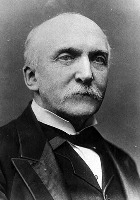Nicholas Flood Davin
Nicholas Flood Davin Poems
A youthful giant, golden-haired
With fearless forehead, eye of blue,
And large and clear its frosty depths,
With fire within its darkn’ing hue
...
Nicholas Flood Davin Biography
Nicholas Flood Davin (January 13, 1840 – October 18, 1901) Nicholas Flood Davin was a lawyer, journalist and politician, born at Kilfinane, Ireland. The first MP for Assiniboia West (1887–1900), Davin was known as the voice of the North-West. A spellbinding speaker, Davin founded and edited the Regina Leader, the first newspaper in Assiniboia. He tried to gain provincial status for the territory. Davin produced the Report on Industrial Schools for Indians and Half-Breeds, otherwise known as The Davin Report, in which he advised the federal government to institute residential schools for native youth; a recommendation that decimated Canadian Aboriginal families.Davin was a parliamentary and war correspondent in England before arriving in Toronto in 1872, where he wrote for the Globe and the Mail. Although a fully qualified lawyer, Davin practised little law. The highlight of his legal career was his 1880 defence of George Bennett, who murdered George Brown. A chance visit to the West in 1882 determined his future. In 1883, he founded and edited the Regina Leader, the first newspaper in Assiniboia; the paper carried his detailed reports of the 1885 trial of Louis Riel. A spellbinding speaker and Conservative MP for Assiniboia West from 1887–1900, Davin tried to gain provincial status for the territory, economic and property advantages for the new settlers–even the franchise for women–but he never achieved his ambition to be a Cabinet minister. A mercurial personality, he became depressed by the decline of his political and personal fortunes and shot himself during a visit to Winnipeg on October 18, 1901. Davin wrote The Irishman in Canada (1877), as well as poetry and an unpublished novel. Davin used, among others, the literary device of intertextuality to draw upon British canonical writers including Tennyson, Bryon and Shakespeare to connect the associations of empire with his 19th-century audience. In 1876, Davin wrote an adaptation of Shakespeare The Fair Grit; or The Advantages of Coalition. A Farce, an adaptation of Shakespeare’s Romeo and Juliet. The play is a farce on governmental coalitions and the corrupted role of media in Canadian politics – a power fully realized by Davin as a writer and founder of the Regina Leader newspaper located in Canada’s North-West. Three years later, Davin produced the Report on Industrial Schools for Indians and Half-Breeds, otherwise known as The Davin Report (1879), in which he advised John A. Macdonald’s federal government to institute residential schools for Indigenous youth; a recommendation that decimated Canadian Aboriginal families. In 1884, while visiting Ottawa, Davin wrote Eos – A Prairie Dream (1884), a collection of poems that, in his own words, "strike a true and high note in Canadian politics and literature" while he represents, through his poetry, the destruction of Aboriginal culture (Moll, "The Davin Report: Shakespeare and Canada's Manifest Destiny," Canadian Adaptations of Shakespeare Project, par 2).)
The Best Poem Of Nicholas Flood Davin
Young Canada
A youthful giant, golden-haired
With fearless forehead, eye of blue,
And large and clear its frosty depths,
With fire within its darkn’ing hue.
His spear which dwarfs the tallest pine,
5
Is bound around with yellow grain,
His shield is rich in varied scenes,
To right and left loud roars the main.
A-top eternal snow is piled;
Bright chains of lakes flash down through woods
10
Now bleak, now green, now gold, now fire,
Touched by the season’s changing moods.
He dreameth of unborn times;
With manhood’s thoughts his mind is braced;
He’ll teach the world a lesson yet,
15
And with the mightiest must be placed.
Heaven’s best star his footsteps guide!
Give him to know what’s truly great!
Not wealth ill-got or ill-enjoyed;
For power—no thrall to lust or hate; [Page 133]
20
But equal heart—the thirst for truth—
A mind strong to produce and pry—
The love of man—the generous heat
That makes the hero glad to die!
If pure in purpose as he’s strong,
25
Nothing of danger need he fear;
But better far than base success,
To ride on an untimely bier.
But fear be hushed! Good omens beckon;
Who counselled wrong will soon be far.
30
Beyond the hill a voice is calling,
Its notes ring clear above the jar
Of passing strifes and paling passions—
Hell’s wild battle ’mid mortal graves;
And with it, hark! the great bass mingles
35
Of Atlantic and Pacific waves:
“Not Scotch, nor Irish, French, nor Saxon,
But all of these and yet our own;
There are no beaten paths to greatness;
Who’d scale those heights must climb alone.
40
Ierne’s heart, compact of joy
And sorrow, wealth of feeling brings;
France, sweetness for each word and act—
The gaiety that ever sings.
From Scotland, thrift and strength you borrow—
45
John Knox’s strength and Burns’ liberal heart;
The Saxon breadth and compromise
Shall lend; but you the larger part [Page 134]
Of your own destiny must be;
Yours to direct—you light the fire—
50
The animating soul’s your gift,
For all fair things the high desire.”
The voice dies o’er the dews of morning,
Which round him glitter while shadows flee,
Bright concord beams from shore to shore,
55
Glad union peals from sea to sea!
